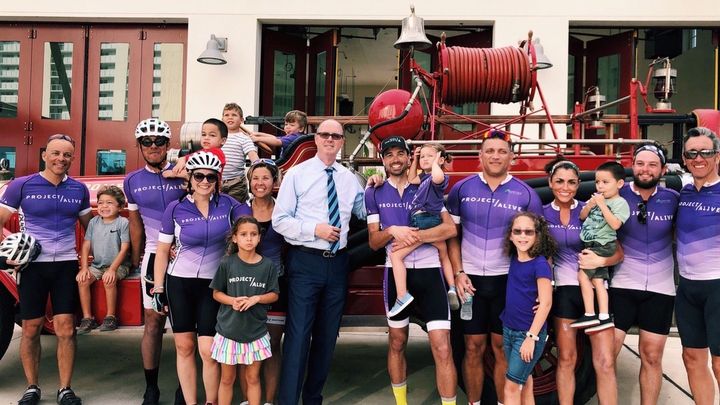
Project Alive Gene Therapy
Donation protected
All funds raised benefit the mission of Project Alive, a 501(c)(3) not-for-profit, which is to support a cure for Hunter Syndrome / MPS II. Donations are tax deductible (Tax ID: 46-4617970).
WE BELIEVE A CURE IS WITHIN REACH
Hunter Syndrome (MPS II) is a rare genetic disease that affects less than 500 boys in the United States. These boys are missing an enzyme used to break down cellular waste. When that waste builds up, it leads to progressive damage throughout their little bodies. Some never develop speech, but some boys learn like a typical child then begin losing skills and what they’ve learned at a young age. They eventually lose the ability to walk, talk and eat. Most do not live to see their teen years.
Gene therapy is a revolutionary approach to treating genetic diseases. It involves a one-time delivery of a normal copy of the defective gene which ideally causes the body to naturally produce the missing enzyme. It is the most promising ‘cure’ that these boys desperately need.
WHAT RESEARCH HAS BEEN DONE ON GENE THERAPY?
In 2013, after it had been performed on other forms of MPS with positive results, a group of Hunter Syndrome families initiated a partnership with researchers at Nationwide Children’s Hospital in Columbus, Ohio to begin gene therapy research in Hunter Syndrome / MPS II. Now, the researchers are in the final stages of developing the first gene therapy clinical trial for boys with Hunter Syndrome. The only obstacle is the substantial funding required for such a trial. If the necessary funds are raised, the trial could begin as early as late 2017 or early 2018.
WHY ISN’T THE CLINICAL TRIAL MOVING FORWARD?
In the world of medicine, this treatment is considered an ‘orphan drug’ because of the small patient population it seeks to treat. In the US, an orphan drug is a treatment for a disease that affects less than 200,000 people. Drug companies fund much of the research for more common diseases because in developing a potential blockbuster drug for a large patient population, they also are more likely to make a profit. Few companies are willing to invest in research for such a small population – only an estimated 500 boys with Hunter Syndrome live in the United States. Without drug companies pursuing a cure for Hunter Syndrome, families tackled that lofty goal and have finally reached the point where a potential cure is ready and waiting with one obstacle: funding it.
Documentary Series
Episode 1. 'To Choose A Path'
Episode 2. 'Noah'
Episode 3. 'Finn'
Episode 4. 'Just Like Me'
Episode 5. 'This is Jack'
WE BELIEVE A CURE IS WITHIN REACH
Hunter Syndrome (MPS II) is a rare genetic disease that affects less than 500 boys in the United States. These boys are missing an enzyme used to break down cellular waste. When that waste builds up, it leads to progressive damage throughout their little bodies. Some never develop speech, but some boys learn like a typical child then begin losing skills and what they’ve learned at a young age. They eventually lose the ability to walk, talk and eat. Most do not live to see their teen years.
Gene therapy is a revolutionary approach to treating genetic diseases. It involves a one-time delivery of a normal copy of the defective gene which ideally causes the body to naturally produce the missing enzyme. It is the most promising ‘cure’ that these boys desperately need.
WHAT RESEARCH HAS BEEN DONE ON GENE THERAPY?
In 2013, after it had been performed on other forms of MPS with positive results, a group of Hunter Syndrome families initiated a partnership with researchers at Nationwide Children’s Hospital in Columbus, Ohio to begin gene therapy research in Hunter Syndrome / MPS II. Now, the researchers are in the final stages of developing the first gene therapy clinical trial for boys with Hunter Syndrome. The only obstacle is the substantial funding required for such a trial. If the necessary funds are raised, the trial could begin as early as late 2017 or early 2018.
WHY ISN’T THE CLINICAL TRIAL MOVING FORWARD?
In the world of medicine, this treatment is considered an ‘orphan drug’ because of the small patient population it seeks to treat. In the US, an orphan drug is a treatment for a disease that affects less than 200,000 people. Drug companies fund much of the research for more common diseases because in developing a potential blockbuster drug for a large patient population, they also are more likely to make a profit. Few companies are willing to invest in research for such a small population – only an estimated 500 boys with Hunter Syndrome live in the United States. Without drug companies pursuing a cure for Hunter Syndrome, families tackled that lofty goal and have finally reached the point where a potential cure is ready and waiting with one obstacle: funding it.
Documentary Series
Episode 1. 'To Choose A Path'
Episode 2. 'Noah'
Episode 3. 'Finn'
Episode 4. 'Just Like Me'
Episode 5. 'This is Jack'
Organizer and beneficiary
Jon Muedder
Organizer
Thompson's Station, TN
Karen Beatty
Beneficiary